Junzhuo Li
Deconstructing Pre-training: Knowledge Attribution Analysis in MoE and Dense Models
Jan 13, 2026Abstract:Mixture-of-Experts (MoE) architectures decouple model capacity from per-token computation, enabling scaling beyond the computational limits imposed by dense scaling laws. Yet how MoE architectures shape knowledge acquisition during pre-training, and how this process differs from dense architectures, remains unknown. To address this issue, we introduce Gated-LPI (Log-Probability Increase), a neuron-level attribution metric that decomposes log-probability increase across neurons. We present a time-resolved comparison of knowledge acquisition dynamics in MoE and dense architectures, tracking checkpoints over 1.2M training steps (~ 5.0T tokens) and 600K training steps (~ 2.5T tokens), respectively. Our experiments uncover three patterns: (1) Low-entropy backbone. The top approximately 1% of MoE neurons capture over 45% of positive updates, forming a high-utility core, which is absent in the dense baseline. (2) Early consolidation. The MoE model locks into a stable importance profile within < 100K steps, whereas the dense model remains volatile throughout training. (3) Functional robustness. Masking the ten most important MoE attention heads reduces relational HIT@10 by < 10%, compared with > 50% for the dense model, showing that sparsity fosters distributed -- rather than brittle -- knowledge storage. These patterns collectively demonstrate that sparsity fosters an intrinsically stable and distributed computational backbone from early in training, helping bridge the gap between sparse architectures and training-time interpretability.
Decoding Knowledge Attribution in Mixture-of-Experts: A Framework of Basic-Refinement Collaboration and Efficiency Analysis
May 30, 2025Abstract:The interpretability of Mixture-of-Experts (MoE) models, especially those with heterogeneous designs, remains underexplored. Existing attribution methods for dense models fail to capture dynamic routing-expert interactions in sparse MoE architectures. To address this issue, we propose a cross-level attribution algorithm to analyze sparse MoE architectures (Qwen 1.5-MoE, OLMoE, Mixtral-8x7B) against dense models (Qwen 1.5-7B, Llama-7B, Mixtral-7B). Results show MoE models achieve 37% higher per-layer efficiency via a "mid-activation, late-amplification" pattern: early layers screen experts, while late layers refine knowledge collaboratively. Ablation studies reveal a "basic-refinement" framework--shared experts handle general tasks (entity recognition), while routed experts specialize in domain-specific processing (geographic attributes). Semantic-driven routing is evidenced by strong correlations between attention heads and experts (r=0.68), enabling task-aware coordination. Notably, architectural depth dictates robustness: deep Qwen 1.5-MoE mitigates expert failures (e.g., 43% MRR drop in geographic tasks when blocking top-10 experts) through shared expert redundancy, whereas shallow OLMoE suffers severe degradation (76% drop). Task sensitivity further guides design: core-sensitive tasks (geography) require concentrated expertise, while distributed-tolerant tasks (object attributes) leverage broader participation. These insights advance MoE interpretability, offering principles to balance efficiency, specialization, and robustness.
Unveiling Instruction-Specific Neurons & Experts: An Analytical Framework for LLM's Instruction-Following Capabilities
May 27, 2025Abstract:The finetuning of Large Language Models (LLMs) has significantly advanced their instruction-following capabilities, yet the underlying computational mechanisms driving these improvements remain poorly understood. This study systematically examines how fine-tuning reconfigures LLM computations by isolating and analyzing instruction-specific sparse components, i.e., neurons in dense models and both neurons and experts in Mixture-of-Experts (MoE) architectures. In particular, we introduce HexaInst, a carefully curated and balanced instructional dataset spanning six distinct categories, and propose SPARCOM, a novel analytical framework comprising three key contributions: (1) a method for identifying these sparse components, (2) an evaluation of their functional generality and uniqueness, and (3) a systematic comparison of their alterations. Through experiments, we demonstrate functional generality, uniqueness, and the critical role of these components in instruction execution. By elucidating the relationship between fine-tuning-induced adaptations and sparse computational substrates, this work provides deeper insights into how LLMs internalize instruction-following behavior for the trustworthy LLM community.
LoTA-QAF: Lossless Ternary Adaptation for Quantization-Aware Fine-Tuning
May 24, 2025Abstract:Quantization and fine-tuning are crucial for deploying large language models (LLMs) on resource-constrained edge devices. However, fine-tuning quantized models presents significant challenges, primarily stemming from: First, the mismatch in data types between the low-precision quantized weights (e.g., 4-bit) and the high-precision adaptation weights (e.g., 16-bit). This mismatch limits the computational efficiency advantage offered by quantized weights during inference. Second, potential accuracy degradation when merging these high-precision adaptation weights into the low-precision quantized weights, as the adaptation weights often necessitate approximation or truncation. Third, as far as we know, no existing methods support the lossless merging of adaptation while adjusting all quantized weights. To address these challenges, we introduce lossless ternary adaptation for quantization-aware fine-tuning (LoTA-QAF). This is a novel fine-tuning method specifically designed for quantized LLMs, enabling the lossless merging of ternary adaptation weights into quantized weights and the adjustment of all quantized weights. LoTA-QAF operates through a combination of: i) A custom-designed ternary adaptation (TA) that aligns ternary weights with the quantization grid and uses these ternary weights to adjust quantized weights. ii) A TA-based mechanism that enables the lossless merging of adaptation weights. iii) Ternary signed gradient descent (t-SignSGD) for updating the TA weights. We apply LoTA-QAF to Llama-3.1/3.3 and Qwen-2.5 model families and validate its effectiveness on several downstream tasks. On the MMLU benchmark, our method effectively recovers performance for quantized models, surpassing 16-bit LoRA by up to 5.14\%. For task-specific fine-tuning, 16-bit LoRA achieves superior results, but LoTA-QAF still outperforms other methods.
Internal Chain-of-Thought: Empirical Evidence for Layer-wise Subtask Scheduling in LLMs
May 20, 2025Abstract:We show that large language models (LLMs) exhibit an $\textit{internal chain-of-thought}$: they sequentially decompose and execute composite tasks layer-by-layer. Two claims ground our study: (i) distinct subtasks are learned at different network depths, and (ii) these subtasks are executed sequentially across layers. On a benchmark of 15 two-step composite tasks, we employ layer-from context-masking and propose a novel cross-task patching method, confirming (i). To examine claim (ii), we apply LogitLens to decode hidden states, revealing a consistent layerwise execution pattern. We further replicate our analysis on the real-world $\text{TRACE}$ benchmark, observing the same stepwise dynamics. Together, our results enhance LLMs transparency by showing their capacity to internally plan and execute subtasks (or instructions), opening avenues for fine-grained, instruction-level activation steering.
Capturing Nuanced Preferences: Preference-Aligned Distillation for Small Language Models
Feb 20, 2025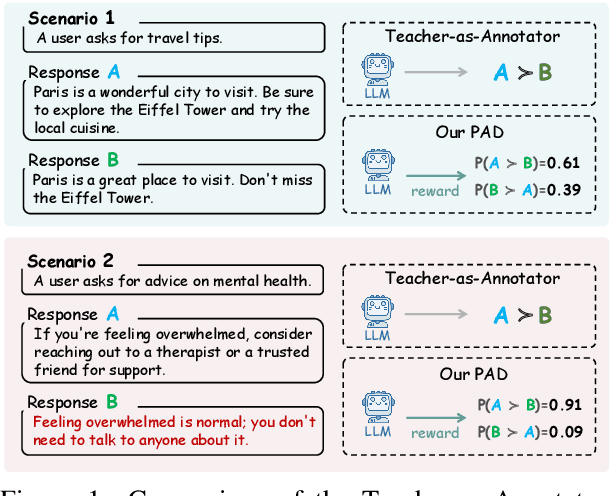
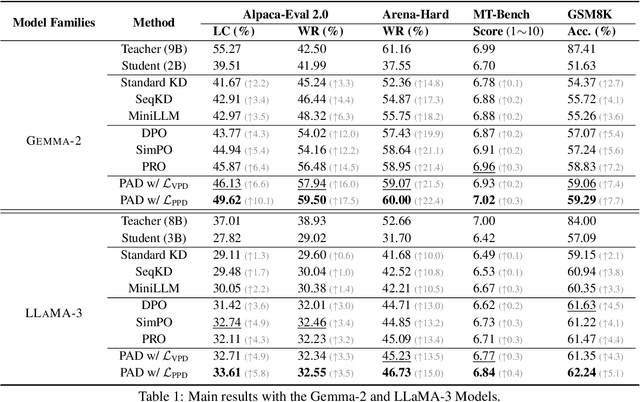
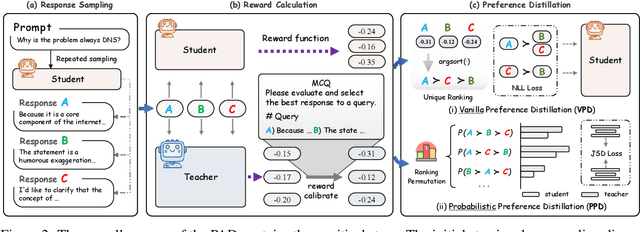
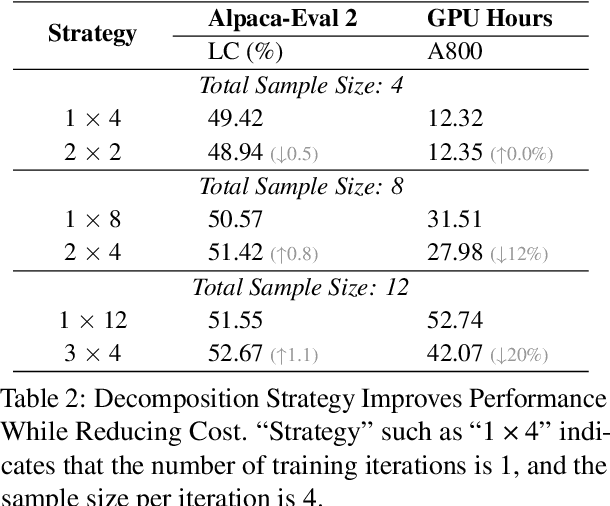
Abstract:Aligning small language models (SLMs) with human values typically involves distilling preference knowledge from large language models (LLMs). However, existing distillation methods model preference knowledge in teacher LLMs by comparing pairwise responses, overlooking the extent of difference between responses. This limitation hinders student SLMs from capturing the nuanced preferences for multiple responses. In this paper, we propose a Preference-Aligned Distillation (PAD) framework, which models teacher's preference knowledge as a probability distribution over all potential preferences, thereby providing more nuanced supervisory signals. Our insight in developing PAD is rooted in the demonstration that language models can serve as reward functions, reflecting their intrinsic preferences. Based on this, PAD comprises three key steps: (1) sampling diverse responses using high-temperature; (2) computing rewards for both teacher and student to construct their intrinsic preference; and (3) training the student's intrinsic preference distribution to align with the teacher's. Experiments on four mainstream alignment benchmarks demonstrate that PAD consistently and significantly outperforms existing approaches, achieving over 20\% improvement on AlpacaEval 2 and Arena-Hard, indicating superior alignment with human preferences. Notably, on MT-Bench, using the \textsc{Gemma} model family, the student trained by PAD surpasses its teacher, further validating the effectiveness of our PAD.
The Fine Line: Navigating Large Language Model Pretraining with Down-streaming Capability Analysis
Apr 01, 2024



Abstract:Uncovering early-stage metrics that reflect final model performance is one core principle for large-scale pretraining. The existing scaling law demonstrates the power-law correlation between pretraining loss and training flops, which serves as an important indicator of the current training state for large language models. However, this principle only focuses on the model's compression properties on the training data, resulting in an inconsistency with the ability improvements on the downstream tasks. Some follow-up works attempted to extend the scaling-law to more complex metrics (such as hyperparameters), but still lacked a comprehensive analysis of the dynamic differences among various capabilities during pretraining. To address the aforementioned limitations, this paper undertakes a comprehensive comparison of model capabilities at various pretraining intermediate checkpoints. Through this analysis, we confirm that specific downstream metrics exhibit similar training dynamics across models of different sizes, up to 67 billion parameters. In addition to our core findings, we've reproduced Amber and OpenLLaMA, releasing their intermediate checkpoints. This initiative offers valuable resources to the research community and facilitates the verification and exploration of LLM pretraining by open-source researchers. Besides, we provide empirical summaries, including performance comparisons of different models and capabilities, and tuition of key metrics for different training phases. Based on these findings, we provide a more user-friendly strategy for evaluating the optimization state, offering guidance for establishing a stable pretraining process.
Language Representation Projection: Can We Transfer Factual Knowledge across Languages in Multilingual Language Models?
Nov 07, 2023



Abstract:Multilingual pretrained language models serve as repositories of multilingual factual knowledge. Nevertheless, a substantial performance gap of factual knowledge probing exists between high-resource languages and low-resource languages, suggesting limited implicit factual knowledge transfer across languages in multilingual pretrained language models. This paper investigates the feasibility of explicitly transferring relatively rich factual knowledge from English to non-English languages. To accomplish this, we propose two parameter-free $\textbf{L}$anguage $\textbf{R}$epresentation $\textbf{P}$rojection modules (LRP2). The first module converts non-English representations into English-like equivalents, while the second module reverts English-like representations back into representations of the corresponding non-English language. Experimental results on the mLAMA dataset demonstrate that LRP2 significantly improves factual knowledge retrieval accuracy and facilitates knowledge transferability across diverse non-English languages. We further investigate the working mechanism of LRP2 from the perspectives of representation space and cross-lingual knowledge neuron.
DEPN: Detecting and Editing Privacy Neurons in Pretrained Language Models
Oct 31, 2023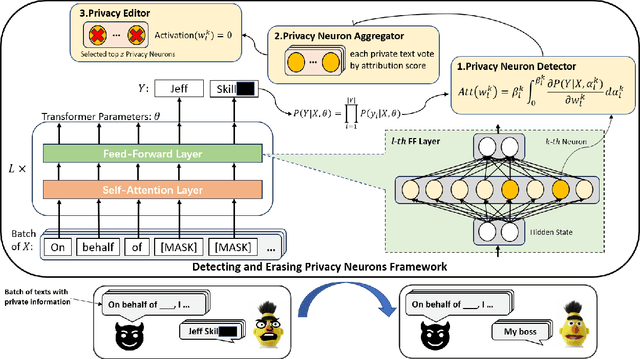

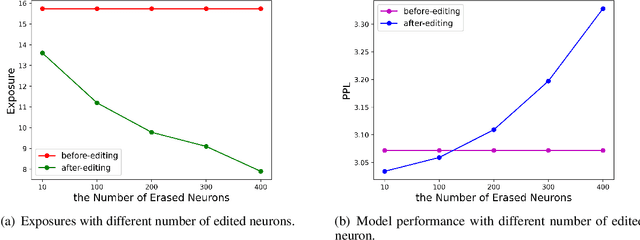

Abstract:Large language models pretrained on a huge amount of data capture rich knowledge and information in the training data. The ability of data memorization and regurgitation in pretrained language models, revealed in previous studies, brings the risk of data leakage. In order to effectively reduce these risks, we propose a framework DEPN to Detect and Edit Privacy Neurons in pretrained language models, partially inspired by knowledge neurons and model editing. In DEPN, we introduce a novel method, termed as privacy neuron detector, to locate neurons associated with private information, and then edit these detected privacy neurons by setting their activations to zero. Furthermore, we propose a privacy neuron aggregator dememorize private information in a batch processing manner. Experimental results show that our method can significantly and efficiently reduce the exposure of private data leakage without deteriorating the performance of the model. Additionally, we empirically demonstrate the relationship between model memorization and privacy neurons, from multiple perspectives, including model size, training time, prompts, privacy neuron distribution, illustrating the robustness of our approach.
FewFedWeight: Few-shot Federated Learning Framework across Multiple NLP Tasks
Dec 16, 2022



Abstract:Massively multi-task learning with large language models has recently made substantial progress on few-shot generalization. However, this is usually performed in a centralized learning fashion, ignoring the privacy sensitivity issue of (annotated) data used in multiple tasks. To mitigate this issue, we propose FewFedWeight, a few-shot federated learning framework across multiple tasks, to achieve the best of both worlds: privacy preservation and cross-task generalization. FewFedWeight trains client models in isolated devices without sharing data. It broadcasts the global model in the server to each client and produces pseudo data for clients so that knowledge from the global model can be explored to enhance few-shot learning of each client model. An energy-based algorithm is further proposed to weight pseudo samples in order to reduce the negative impact of noise from the generated pseudo data. Adaptive model weights of client models are also tuned according to their performance. We use these model weights to dynamically aggregate client models to update the global model. Experiments on 118 NLP tasks show that FewFedWeight can significantly improve the performance of client models on 61% tasks with an average performance improvement rate of 30.5% over the baseline and substantially outperform FedAvg and other decentralized learning methods.
 Add to Chrome
Add to Chrome Add to Firefox
Add to Firefox Add to Edge
Add to Edge